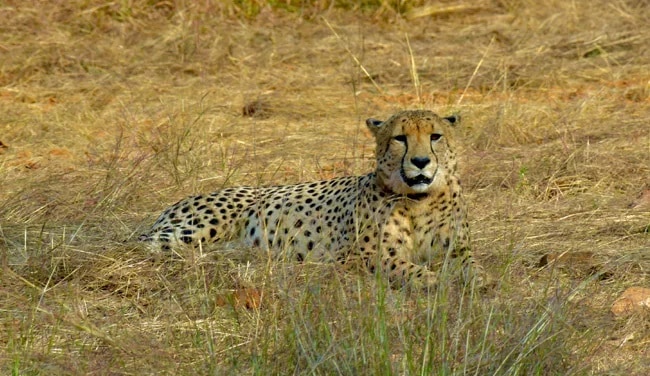A few days after the death of the seventh cheetah brought from South Africa, cheetah Suraj, translocated from Namibia, died at the Kuno National Park in Madhya Pradesh on Friday. He is the eighth cheetah to die in the past five months.
The cause of Suraj’s death is yet to be known. Earlier on Tuesday, Cheetah Tejas was found dead at the national park. The feline’s autopsy had revealed that the cheetah was unable to recover from a “traumatic shock” after a violent fight with a female cheetah.
On March 27, a female Cheetah named Sasha died due to kidney ailment, on April 23, Uday died of cardio-pulmonary failure and on May 9, Daksha, a female cheetah, died after a violent interaction with a male during a mating attempt.
Also Read: Cheetah from Namibia gives birth to four cubs at Kuno National Park in Madhya Pradesh
In March, four cubs were born to Siyaya (Jwala). However, after a couple of months, in May, a two-month-old cub died. Prima facie, the cub died of weakness. Days after the death of the first cub, two more cheetah cubs of Siyaya died.
Earlier, the Centre had denied any lapses behind the deaths of the six cheetahs. “There is no lapse behind any of the cheetah deaths. Even in the case of the deaths of the three cheetah cubs, global wildlife literature clearly mentions 90% per cent infant mortality among cheetahs,” said an official.
In May, South African wildlife expert Vincent Nan Der Merwe had predicted more cheetah deaths and said that the reintroduction project is going to see an even higher mortality, when the cheetahs would try to establish territories and come face to face with leopards and tigers at the park.
Also Read: South Africa, India sign MoU to translocate 12 cheetahs to Kuno National Park in Madhya Pradesh
Suraj’s death is yet another blow to the Centre’s cheetah reintroduction programme launched in September last year by Prime Minister Narendra Modi.
Eight cheetahs were brought to India from Namibia and released at Kuno on September 17 last year. In February, 12 more cheetahs were brought in from South Africa, of which six are in the wild and the remaining in various enclosures at Kuno.

